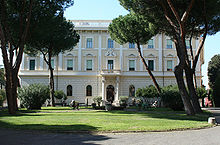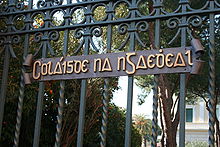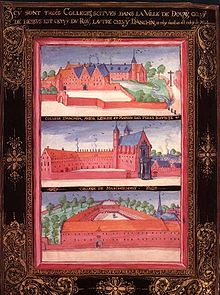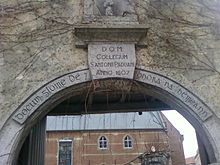- Irish College
-
 The Pontifical Irish College, Rome, Italy
The Pontifical Irish College, Rome, Italy Colleges at University of Douai
Colleges at University of Douai
Irish Colleges is the collective name used for approximately 34 centres of education for Irish Catholic clergy and lay people opened on continental Europe in the 16th, 17th and 18th centuries. The Colleges were set up to educate Roman Catholics from Ireland in their own religion following the takeover of the country by the Protestant English state in the Tudor conquest of Ireland. Irish Catholics also left the country to pursue military careers in the Flight of the Wild Geese.
The first Irish Colleges were set up in Spain in the 1580s in Salamanca and Madrid under the supervision of the Jesuit priest James Archer.
There were several early Irish Colleges in Southern Netherlands. St. Patrick Irish college of Douai was founded in 1603 by Christopher Cusack, with the support of Philip III of Spain. The Irish College at Douai was integrated to the Faculty of Theology of the University of Douai in 1610. St Anthony's College, the Irish Franciscan College in Leuven, was co-founded in May 1607 by Aodh Mac Cathmhaoil (also known as Aodh Mac Aingil) and Flaithri Ó Maolconaire, Irish Franciscan, theologian and aide to Aodh Ruadh Ó Domhnaill . The College was founded under the patronage of Philip III of Spain.
The Irish College in Paris was co-founded in 1605 by John Lee and John de l'Escalopier, President of the Parliament of Paris.
More Colleges were established in Rome (1625), Toulouse, Bordeaux, Nantes, Lille, Brussels, Antwerp and then Prague (1631).[1] Some of the Colleges fell out of use in the late 18th century as the Penal Laws against Roman Catholics in Ireland were relaxed.
Irish colleges were important centres for the writing of Irish history and the preservation of Ireland’s rich cultural traditions. Mícheál Ó Cléirigh was sent from an Irish college to Ireland to compile the Annals of the Four Masters, an important chronicle of Irish history. Within the colleges, printing press in the Irish language were established and a collection of the lives of Irish saints was produced. Irish colleges were also helpful for the Irish resistance during the Nine Years' War in Ireland and later exile on the European continent.
On 16 October 1802, Irish colleges located in Toulouse, Bordeaux, Nantes, Douai, Lille, Antwerp, Leuven and Paris were merged under a unique administration, alongside the Scottish College in Douai and Scots College in Paris.
In the last decade, the Irish Government has financed the renovation of the premises of the Irish College in Paris which now serves as an Irish Cultural Centre and a residence for Irish students, writers and artists. The Pontifical Irish College in Rome continues to be used for the education and training of Roman Catholic clergy. In 1983 the Irish College in Leuven was made available by the Irish Franciscans for development as a secular resource, The Leuven Institute for Ireland in Europe is now located on the premises.
See also
- Irish College, Douai (France)
- Irish College in Paris (France)
- Pontifical Irish College, Rome (Italy)
- Early Modern Ireland 1536-1691
- James Bartholomew Blackwell - revolutionary soldier
- Nicholas French
- Colegio Mayor de Santiago el Zebedeo, Salamanca (Spain)
References
- ^ Anderson, Christopher, Historical Sketches of the Ancient Native Irish and Their Descendants (1830) p.118
External links
- Irish Colleges on the European Continent - Catholic Encyclopedia
- Irish College in Rome - Catholic Encyclopedia
- [1] - official site of the only remaining college on the continent, the Pontifical Irish College Rome
- The National Library of Ireland's current exhibition, Strangers to Citizens: the Irish in Europe, 1600-1800
- Irish College Leuven
- Pontifical Irish College Rome
Categories:- Roman Catholic universities and colleges
Wikimedia Foundation. 2010.



